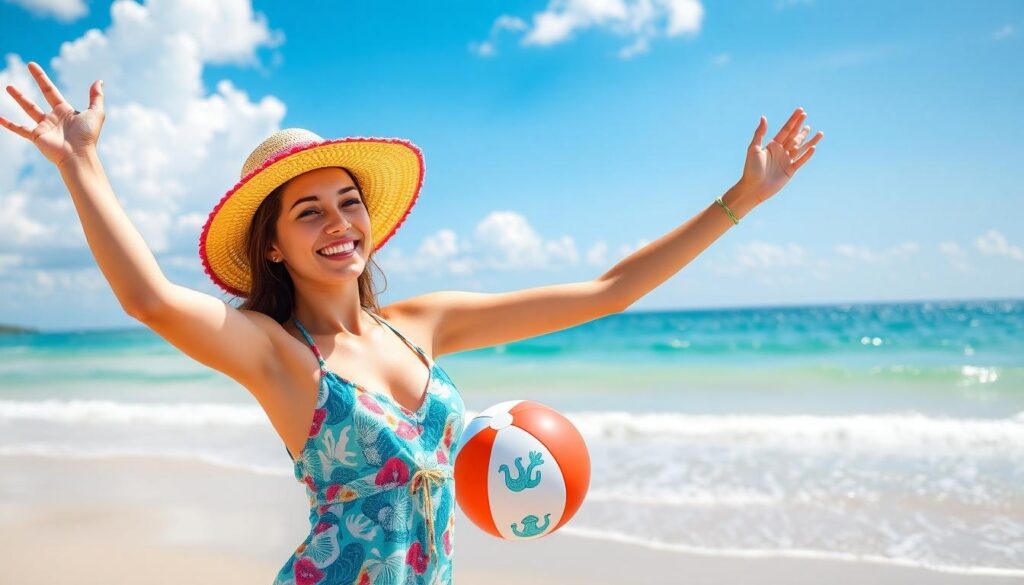Jump into a wave of laughter with our collection of ocean puns that are shore to make you smile! We’ve trawled the depths of humor to bring you the funniest, most fin-tastic wordplay that’ll have you rolling on the beach with laughter. From clever quips about sea creatures to witty one-liners about the deep blue, our comprehensive list has it all.
Why do we love ocean puns so much? Because they’re the perfect way to make a splash at parties, brighten someone’s day, or simply entertain yourself during those long summer days by the water. Whether you’re a marine biologist, a beach enthusiast, or someone who just appreciates a good play on words, you’ll find these puns absolutely current and refreshing.
20 Fin-tastic Ocean Puns That Will Make a Splash
- What did the ocean say to the beach? Just waving hello!
- Why don’t oysters share their pearls? They’re too shellfish!
- How do you organize an ocean party? You dive right in and sea what happens!
- What’s a fish’s favorite instrument? The bass guitar, of course!
- Why did the crab never share? Because he’s a little shellfish!
- What do you call a fish wearing a crown? King of the coral!
- How do fish get from place to place? They take the otter route!
- What did the shark say after eating a clownfish? This tastes a little funny!
- Why don’t fish play basketball? They’re afraid of the net!
- What’s a whale’s favorite TV show? Orca Winfrey!
- How do turtles communicate? They use shell phones!
- What lies at the bottom of the sea and twitches? A nervous wreck!
- Why don’t sharks attack lawyers? Professional courtesy!
- What kind of fish perform operations? Sturgeon generals!
- How do sailors stay in touch? Pier to pier networking!
- What did one tide pool say to the other? Shore is nice to see you!
- Why don’t ships ever sink in the Dead Sea? They’re too buoyant to bay-lieve it!
- What’s a dolphin’s favorite TV channel? Flipper!
- How do you make an octopus laugh? With ten-tickles!
Sea-riously Funny Ocean Puns for Beach Lovers

Shell-ebrate Good Times With These Coastal Jokes
Beach parties deserve some special humor, and what better way to lighten the mood than with some coastal jokes? “Shell-ebrate” your time at the shore with this collection of witty wordplay that’s perfect for beach gatherings. We’ve gathered some classic ocean puns that’ll help “tide you over” during those long summer days by the water. Try asking your friends why the octopus crossed the road—to get to the other tide! Or perhaps share the joke about the fish who wanted a job because it needed to earn a little extra scale. Don’t be afraid to tell someone “don’t be a beach” when they’re being difficult, or ask them to “kelp me” when you need assistance with setting up the beach umbrella.
Wave Hello to Our Favorite Water Wordplay
Water-based wordplay offers endless opportunities for laughter when you’re enjoying the coastal lifestyle. We find that “fin-tastic” expressions add a splash of fun to any beach conversation. “Sea the day” reminds us all to make the most of our time at the ocean, while “I’m hooked on you” serves as a charming expression of affection with a fishing twist. For music lovers, there’s always the joke about what you call a fish that loves to play guitar—a bass player! When someone’s spoiling your relaxing beach vibe, simply tell them “don’t krill my vibe.” Greeting friends with a playful “Whale, hello there” sets a humorous tone for your beach day. These “sofishticated” puns bring a unique charm to conversations while enjoying the waves and sand.
Diving Deep Into Aquatic Humor: Ocean Puns for Every Occasion

Ocean puns provide a delightful way to inject humor into everyday conversations. Whether you’re looking to brighten someone’s day or add some coastal charm to your communication, these aquatic wordplays are perfect for any occasion.
Sea-themed Puns
“I sea what you did there” works perfectly when acknowledging someone’s clever remark. “Let’s shell-ebrate!” adds festive flair to beach party invitations or ocean-themed celebrations. “Don’t krill my vibe” offers a playful way to ask someone to maintain positive energy. “I’m feeling fin-tastic!” expresses excellent mood with oceanic charm.
Fishy Jokes
What do you call a fish with no eyes? Fsh! This classic wordplay never fails to bring smiles. Why are fish so smart? Because they live in schools! Educational humor at its finest. Why did the fish blush? Because it saw the ocean’s bottom! A little cheeky humor perfect for lightening the mood.
Marine Biology Puns
What do you call a fish that wears a bowtie? Sofishticated! This elegant play on words combines fashion and marine life. What do you call a fish that loves to play guitar? A bass player! Musicians especially appreciate this clever crossover between music and marine life.
Current Events: Puns Perfect for Social Media Posts
Social media thrives on witty captions, and ocean puns make your posts stand out. “Having a whale of a time at the beach!” pairs perfectly with vacation photos showing your beach enjoyment. “I’m shore you’ll love this sunset!” adds wordplay charm to your stunning coastal evening captures. “Just shell-ebrating the weekend!” works wonderfully for Friday posts or weekend beach trip photos.
Tide-al Waves of Laughter for Family Beach Days
Family beach outings become more memorable with shared laughter. “Why did the dolphin bring a towel? Because it wanted to have a whale of a time!” amuses both kids and adults during beach picnics. “What did the ocean say to the beach? Nothing, it just waved!” creates giggles while watching the tide roll in. These simple yet effective jokes help create lasting beach day memories for the whole family.
Ocean Puns That Are Off the Hook for Teachers and Parents

Looking for clever ocean puns to make learning more enjoyable? We’ve gathered some sea-riously awesome wordplay that educators and parents can use to engage children while teaching them about marine life and ocean concepts.
Educational Ocean Puns That Make Learning a Breeze
Educational ocean puns create a positive learning environment while reinforcing important concepts. “You can run but you can’t tide” serves as a playful reminder for students to stay focused on their tasks. Teachers can use “Let’s get kraken” to inject excitement into the beginning of learning sessions about marine biology. “I see what you did there” acknowledges students’ clever ideas during class discussions about ocean topics. “Seas the day” inspires children to take action and embrace learning opportunities about marine ecosystems. These punny phrases make educational moments more memorable while maintaining student engagement throughout lessons about ocean life.
Kid-Friendly Water Wordplay That Won’t Make You Crabby
Children naturally respond to humor, and ocean-themed puns provide the perfect balance of fun and learning. “Don’t be shellfish; share your knowledge” teaches cooperation while discussing marine concepts. Responding with “Stop, you’re kraken me up” when a child shares a joke creates positive reinforcement during learning activities. “Water you talking about?” encourages clear communication in a playful way during ocean-related discussions. Phrases like “Lost in the waves, found in the ocean breeze” inspire children’s natural curiosity about marine environments. “Mermaid at heart, ocean soul” promotes deeper interest in ocean creatures and habitats among young learners.
Kids especially enjoy question-and-answer style puns that teach while entertaining. “What do you call a fish magician? A wizard of the sea” introduces marine ecosystems concepts through humor. “Why are fish so good at playing piano? Because they have great scales” cleverly connects music concepts with fish anatomy. “Why do oceans make great teachers? They keep things on the surface” helps simplify complex subjects for young minds. “How do you organize an ocean party? You planet” engages children with planning skills while incorporating earth science concepts.
Why Ocean Puns Are Shore to Brighten Anyone’s Day

Ocean puns create instant smiles through their clever wordplay and unexpected twists. Most people can’t help but laugh when they hear a well-crafted pun like “What did the sea say to the sand? I love you a whole sandbar.” These linguistic treasures work because they surprise us with dual meanings related to marine environments.
Sharing ocean puns builds connections between people through shared laughter. Friends gather closer when someone asks, “Why did the octopus cross the road? To get to the other tide.” The groan-worthy reaction creates a bonding moment that everyone remembers long after the conversation ends.
Marine-themed jokes provide accessible humor that works across age groups and backgrounds. Children delight in simple puns like “I’m feeling fin-tastic today,” while adults appreciate more sophisticated wordplay such as “What do you call a fish that practices medicine? A sturgeon.” This universal appeal makes ocean puns perfect for family gatherings at the beach.
Creative expression flourishes when we incorporate phrases like “Let’s shell-ebrate!” or “I sea what you did there” into everyday conversations. These playful linguistic moments encourage others to join in with their own oceanic wordplay, creating a ripple effect of creativity and joy throughout any social interaction.
The versatility of ocean puns makes them perfect for countless situations. Whether you’re captioning a beach photo with “Having a whale of a time!” or lightening the mood during a tense meeting with “Why are fish so smart? They always swim in schools,” these maritime jokes adapt to any environment with ease.
How to Incorporate Ocean Puns Into Your Daily Conversations

Ocean puns can add a splash of creativity to your everyday interactions and bring waves of laughter to any conversation. Let’s jump into some practical ways to incorporate these maritime wordplays into your daily life.
Breaking the Ice With Whale-Chosen Words
Ocean-themed puns make excellent conversation starters in casual settings. Greet friends with a cheerful “Whale, hello there!” or tell someone you’re “shore glad to meet them” to instantly create a lighthearted atmosphere. These playful introductions help establish a positive tone from the beginning of your interaction.
Offering encouragement becomes more memorable with phrases like “Don’t be shellfish—let’s collaborate!” or “Keep clam and carry on!” when supporting teammates through challenges. These expressions not only motivate others but also inject humor into potentially stressful situations.
Compliments gain extra charm when delivered with a maritime twist. Tell someone they’re looking “fin-tastic today” or that they’re “making waves with their work” to brighten their day. These unique compliments stand out more than conventional praise and often create instant smiles.
Nautical Nonsense for Special Occasions
Special events deserve special wordplay that captures the celebratory spirit. Kick off festivities with an enthusiastic “Let’s shell-ebrate!” or announce “This calls for a whale of a party!” to set a fun tone for birthdays, promotions, or holiday gatherings.
Invitations become more captivating when you ask “Shell we dance?” or encourage friends to “Come for the snacks, stay for the krill!” These playful phrases make your invites stand out and signal to guests that fun awaits.
Toast-making opportunities are perfect for ocean puns. Raise your glass with “To good times—may they never tide us over!” to add personality to ceremonial moments. These memorable toasts often become talking points long after the event concludes.
When used in workplaces, saying “We’re on the same wavelength” during team meetings can reinforce collaboration while adding a subtle touch of humor. On social media, captions like “Sea you later!” or “Feeling tide-down?” can make your posts more relatable and engagement-worthy.
Educators find ocean puns particularly useful, with jokes like “Why are fish so smart? They swim in schools!” helping to maintain student attention while teaching marine concepts. These educational puns serve the dual purpose of entertaining and reinforcing key learning points.
The Science Behind Why Ocean Puns Make Us Laugh

Ocean puns aren’t just random jokes—they’re carefully crafted linguistic gems that trigger exact cognitive responses in our brains. Research shows these aquatic wordplays work through several scientific mechanisms that explain why we can’t help but chuckle when we hear them.
Wordplay Mechanics
Ocean puns operate through clever linguistic ambiguity that our brains find inherently rewarding. Terms like “fin-tastic” or “so-fish-ticated” substitute homophones and create unexpected connections between marine terminology and everyday language. These substitutions trigger pleasure centers in our brains as we process and resolve the dual meanings. The moment of recognition when we understand the pun creates a small cognitive reward that manifests as laughter or a smile.
Incongruity Theory in Action
The true power behind ocean puns comes from what psychologists call the Incongruity Theory of humor. Our brains experience delight when we resolve conflicting meanings in unexpected ways. For example, when someone mentions a “bass player,” we initially picture a musician, but the pun redirects us to imagine a fish playing an instrument. This cognitive surprise—the moment when our expectations are pleasantly violated—creates the humor response. The greater the unexpected connection between marine life and the secondary meaning, the stronger the humorous effect.
Cultural and Contextual Factors
Accessibility plays a crucial role in why ocean puns work so well. Marine terms like “shell-ebrate” or “wave goodbye” use familiar concepts that most people recognize regardless of their background. This cultural relevance makes ocean puns widely appealing across different audiences. People don’t need specialized knowledge to appreciate most ocean wordplay, which explains their enduring popularity at beach parties and summer gatherings.
Phonetic Structure and Processing
The sound patterns in ocean puns contribute significantly to their effectiveness. Many marine puns use rhymes and alliteration that our brains find satisfying to process. When we hear phrases with pleasing phonetic structures like “wise fish with fins-ight,” our linguistic processing centers experience a form of auditory pleasure. This phonetic familiarity creates a smoother cognitive path to understanding the joke, making the humor more accessible and enjoyable.
Ocean puns like “Why did the octopus cross the road? To get to the other tide!” work by replacing expected phrases (“other side”) with marine-themed alternatives (“other tide”). This dual-meaning construction engages multiple areas of our brain simultaneously, creating a unique cognitive experience that results in humor. The connection between linguistic creativity and humor response demonstrates why a well-crafted ocean pun can instantly lighten the mood in any conversation.
Historical Tides: The Evolution of Ocean Humor Through the Ages

Ocean puns have flowed through human communication for centuries, evolving from simple wordplay to sophisticated linguistic phenomena. Ancient sailors likely initiated this tradition, using sea-related humor to lighten the mood during long voyages. Maritime communities worldwide developed their own aquatic wordplay, creating a rich tapestry of ocean humor that continues to ripple through our culture today.
The fundamental mechanisms of ocean puns have remained consistent throughout history. Homophonic substitution emerged as a primary technique, with words like “sea” replacing “see” and “scale” carrying dual meanings related to both fish anatomy and measurement. These linguistic devices created accessible humor while simultaneously reinforcing marine vocabulary among diverse audiences.
Compound puns represent another historical development in ocean humor. Terms such as “tunaverse” (combining tuna and universe) and “anchovy-hement” (blending anchovy with vehement) showcase how creative layering of aquatic references transformed everyday language. This linguistic evolution mirrors cultural adaptation patterns, demonstrating how language evolves to incorporate specialized terminology.
Modern environmental movements adopted ocean puns as effective communication tools. Organizations like Ocean Conservancy cleverly use phrases like “vitamin-sea” to engage audiences in marine conservation efforts. This strategic deployment of humor serves as a bridge between scientific literacy and public understanding, making complex environmental concepts more accessible.
The educational value of ocean puns has grown significantly in recent decades. Tour guides and educators frequently use “porpoise” puns when discussing cetacean evolution, creating memorable learning experiences for visitors and students alike. These humorous linguistic devices enhance information retention while fostering community through shared laughter and understanding.
Social media has accelerated the evolution and dissemination of ocean humor in unprecedented ways. Marine wordplay now spreads globally in seconds, creating new communities united by their appreciation for aquatic wit. We’ve observed how these puns continue to adapt to contemporary contexts while maintaining their fundamental linguistic structures, proving that ocean humor remains as fluid and ever-changing as the seas that inspire it.
Conclusion: Don’t Be Shellfish – Share These Ocean Puns With Friends
We hope these ocean puns have made a splash in your day! From ancient sailors to modern social media users, marine wordplay continues to unite people through laughter and shared experiences.
Whether you’re looking to brighten someone’s day, enhance a beach outing, or make learning more captivating, these sea-worthy jokes offer something for everyone. The next time you’re by the shore or just feeling blue, remember that a good ocean pun is always just a wave away.
So jump into these fin-tastic jokes and share them widely – after all, laughter is the current that connects us all!
Frequently Asked Questions
Why are ocean puns so popular?
Ocean puns are popular because they combine familiar marine terms with everyday language, creating accessible humor for all ages. Their versatility makes them perfect for social gatherings, beach trips, educational settings, and social media. The shared understanding of ocean references creates an instant connection between people, while the playful nature of these puns brings joy and laughter to any situation.
What makes a good ocean pun?
A good ocean pun cleverly uses marine terminology in unexpected contexts, creating a play on words that’s both surprising and recognizable. The best ocean puns are simple enough for anyone to understand while being creative enough to elicit a genuine laugh. Effective puns like “I’m having a whale of a time” or “That’s fin-tastic” work because they seamlessly blend ocean vocabulary with everyday expressions.
How can I use ocean puns in everyday conversation?
Incorporate ocean puns naturally by responding to situations with phrases like “I sea what you did there” or “That’s shore amazing!” Use them as ice-breakers when meeting new people, especially at beach gatherings. Add them to congratulatory messages with “shell-ebrations” or express excitement with “That sounds fin-tastic!” The key is timing—drop them casually without overusing them for maximum effect.
Are ocean puns appropriate for professional settings?
Ocean puns can work in professional settings when used sparingly and appropriately. They’re particularly fitting for team-building activities, presentations about climate change or marine conservation, or in businesses related to tourism, marine biology, or coastal industries. A well-placed pun can lighten the mood and make information more memorable, but avoid overusing them in formal communications or serious discussions.
How can teachers use ocean puns for education?
Teachers can incorporate ocean puns into lesson plans about marine biology, environmental science, or geography to increase student engagement and memory retention. Create worksheets with punny questions, use them as mnemonic devices for scientific terms, or incorporate them into classroom games. Phrases like “Let’s dive into this topic” or “Don’t be shellfish with your knowledge” make learning more enjoyable while reinforcing ocean vocabulary.
What are some kid-friendly ocean puns?
Kid-friendly ocean puns include “What did the ocean say to the shore? Nothing, it just waved,” “Why don’t shells ever share? Because they’re shellfish,” and “How do fish get to school? By octobus!” These simple puns use concrete concepts that children can visualize and understand. They’re perfect for family beach trips, marine-themed birthday parties, or inspiring young ocean enthusiasts.
How have ocean puns evolved historically?
Ocean puns trace back to ancient sailors who used wordplay to lighten long voyages. They evolved through maritime folklore and sea shanties before becoming mainstream entertainment. In the 20th century, beach culture popularized ocean humor in advertising and entertainment. Today, social media has accelerated the creation and spread of new marine wordplay, with environmental movements adopting ocean puns to raise awareness about conservation issues.
Can ocean puns help with environmental awareness?
Yes, ocean puns effectively raise environmental awareness by making marine conservation messages more engaging and shareable. Organizations use catchy phrases like “Seas the day” or “Don’t be trashy” in campaigns against plastic pollution. The humor helps break through message fatigue, making critical information about ocean health more accessible and memorable, while encouraging wider sharing of important environmental messages.







